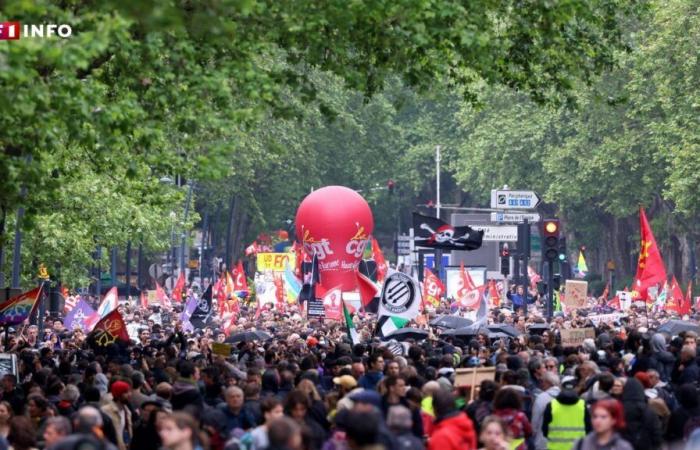This Thursday, May 1, is a holiday and non -working in France, on the occasion of the International Workers’ day.
Its origin dates back more than a century back: France celebrates this Thursday May 1, International Workers’ Day. In our country, where it is linked to strong social demands (new window)this is the only feast of the year both a holiday and unemployed. The day is also a public holiday in many of our European neighbors, but the ban on working is only worth a few countries.
The May 1st found its origins in 1886, in the United States: American unions choose this date, at which the accounting year begins for companies, to claim the day of eight hours of work. A massive strike then degenerated in Chicago, leading to several dead among the police and demonstrators. Then the mobilization will be taken up in Europe, and in particular in Paris, where the 289 Socialist International International was held in 1889, which decided to establish demonstrations on May 1 (new window). The following year, the first “International Workers’ Day” takes place in several countries of the world, rewinds the information portal on European issues all of Europe (new window).
The work prohibited in certain countries, with several exceptions
The celebration is of particular importance in France, where a dozen demonstrators were killed during the 1891 demonstration, during the Fourmies shooting in the North. The day was established as “Labor Day and Social Concord” under the Vichy regime, then became officially unemployed (new window) In 1947. But several other European countries also attached a strong importance to this day: the May 1 is a holiday in 24 of the 27 countries of the European Union today. The figure even rises to 25 counting Ireland, which also celebrates the day of workers, but the first Monday in May. The United Kingdom, which has left the twenty-seven, in fact the same, a feast baptized “May Day”.
On the other hand, the countries to be unemployed this day are not numerous. This is the case in Spain and Poland. With our Spanish neighbors, the day also has a strong social resonance, with demonstrations organized by the unions (new window). This Thursday, organizations planned to parade in 80 cities, according to the newspaper The country (new window). While in Poland, major popular festivals and parades orchestrated by the Communist Party were organized during the USSR period. Little by little, the day was marked by social struggles, with significant strike movements in the early 1980s, after all Europe.
-

Read
1st-May, ascent, Pentecost … What remuneration if you work a public holiday?
In several other countries, the majority of employees do not work either, but several exceptions exist. This is the case in Germany, where it is not authorized to work on public holidays as on Sundays, but where certain sectors benefit from an exemption, including transport or gastronomy, explains a Franco-German law firm (new window).
Also in Belgium, the May 1 has among a list of ten holidays where work is not authorized for employees. But in the sectors working on Sunday, this May 1st is not unemployed. On the other hand, the employee is then entitled to a “Compensatory rest”according to the federal public service (new window). In addition, for all employees, if this party falls on a Sunday or a usual day of inactivity in the company, the law provides for a “Replacement day”which comes to replace the holiday.
Concerts, spring festivals, picnics …
Among the countries where the day is only a holiday, many traditions have emerged. In Italy, the May 1st is celebrated in music, with a concert organized each year on Piazza San Giovanni of Rome by the main trade union organizations in the country, since the 1990s. In several European countries, the 1st-May also coincides with traditional celebrations celebrating the arrival of spring (new window). In Bavaria, Germany, a decorated tree, called the “Mrs of May”is erected on this occasion, often garnished with decorations and painted. It is also an opportunity for a game between villages: the inhabitants have fun trying to “Wanting” The tree of the neighboring town, explains an official Länder website (new window).
Several Scandinavian countries also celebrate these festivals, such as the “First of May” In Finland, in reference to a nun of the 8th century, a day also celebrated by the students, who all display a white cap stoned at the end of the school. The festivities start from April 30 at the end of the day, then stretch all night. On May 1, many giant picnics were organized, especially in Kaivopuisto park in Helsinki. In Sweden, major student demonstrations also take place on this holiday. As for Greece, it also celebrates “Flower Day” That day, inherited from ancient rites.
Do you want to work on May 1st? LCI answers youSource : Info time

17:55
In the Netherlands and Denmark on the other hand, the May 1st is neither a holiday nor unemployed, which does not prevent social mobilization: political demonstrations and parades take place in many cities. With our Dutch neighbors, the absence of a public holiday has several explanations, according to the Dutch newspaper De Telegraaf (new window) : First of all, the proximity to the Queen’s feast, celebrated until 2013 there, but also with May 5, a holiday that marked the liberation of the country during the Second World War. In addition, the social dimension of this day would be less strong than elsewhere. In the 1950s, the union federation of the time considered that many progress had already been made in terms of labor rights.










